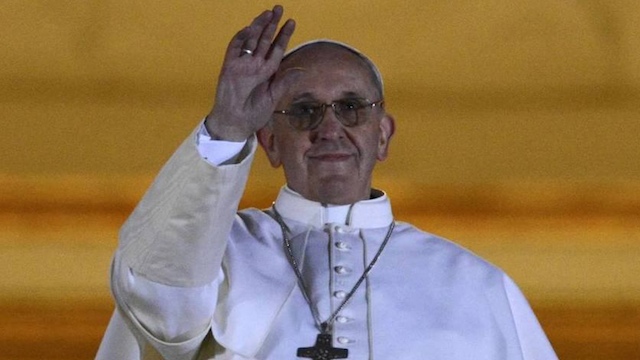SUMMARY
This is AI generated summarization, which may have errors. For context, always refer to the full article.

VATICAN CITY (UPDATED) – The Vatican on Friday, March 15, rejected claims that Pope Francis failed to do enough to protect two priests kidnapped and tortured by Argentina’s military junta and said he had in fact helped save lives.
Jorge Mario Bergoglio, the first pope to hail from Latin America, has been criticized by leftist critics for his actions during Argentina’s “Dirty War” in which 30,000 people died or disappeared from 1976 to 1983.
His role in the arrest of two young Jesuits, Orlando Yorio and Francisco Jalics, who were taken to a notorious torture center by the brutal right-wing junta, has come under intense scrutiny.
Vatican spokesman Federico Lombardi said, “There has never been a credible, concrete accusation against him. The Argentinian justice system… has never charged him with anything.”
He said the campaign against Bergoglio was “well known” but claimed it was defamatory and aimed at discrediting the Church.
“The accusations come from parts of the anti-clerical left to attack the Church and must be denied,” said Lombardi, insisting that Bergoglio “did a lot to protect people during the dictatorship” when he was not yet a bishop.
Horacio Verbitsky, a left-wing Argentine author and militant who has written extensively on the Dirty War, claims that he has found witnesses “who confirm Bergoglio’s role in the military government’s crackdown.”
Bergoglio himself has denied any involvement in the priests’ detention, and even says he intervened with the head of the junta, Jorge Videla, to plead for the two men to be freed. They were released after 5 months.
One of the two priests said on Friday, March 15, he could take no position on Bergoglio’s role in the events, and wished him “God’s rich blessing for his office”.
Francisco Jalics, who now lives in Germany, said he had spoken to Bergoglio years after his release.
“Afterwards we celebrated mass publicly together and we embraced solemnly. I am reconciled with the events and, for my part, consider them finished,” Jalics said in a statement.
Avoid pessimism
The newly-elected pontiff, who is also the first Jesuit pope, earlier urged the troubled Catholic Church that he has inherited
Francis, who is also the first Jesuit pope, earlier Friday, March 15, urged the troubled Church that he has inherited not to succumb to “pessimism” and to find new ways of spreading the faith.
“Let us not give in to pessimism, to that bitterness that the devil offers us every day,” he told an audience of the world’s cardinals on his 3rd day in office.
In a reference to the declining number of worshippers in many parts of the world, he urged the cardinals to find “the courage to persevere and also to find new ways to bring evangelisation to the ends of the earth”.
Francis hailed his predecessor Benedict XVI’s historic resignation as a “courageous and humble act”.
The new pope wore the traditional white vestments but also plain black shoes, not the red footwear favored by his German predecessor, for the address in the 16th-century Clementine Hall in the Apostolic Palace at the Vatican.
He has signalled he will lead a more simple papacy, stripped of the fineries enjoyed by his predecessors.
On Thursday, March 14, he gave a stark warning that the Church, wracked by scandal and Vatican infighting, risked becoming just another charitable organization if it strayed from its true mission.
One million people are expected to attend his inauguration mass on Tuesday, March 19.
The new pontiff is also due to meet his predecessor, who has withdrawn to the papal summer residence in Castel Gandolfo, in the coming days.
The surprise election of the son of an Italian emigrant railway worker — who was not among the frontrunners before the cardinals began their confidential deliberations — has sparked hope for change in the Church.
His elevation is being seen as a nod to the Church’s power in Latin America, which is home to 40% of the world’s Catholics. In Europe, its traditional power base, it is in decline.
Projecting an image as a simple man of the people, the pope has chosen to name himself after St Francis of Assisi, the 13th century saint who shunned the riches of his family to devote himself to God and the poor.
The Vatican revealed that following his election Francis had chosen to ride in a minibus with his fellow cardinals rather than the papal limousine. He also returned to his lodgings to pay his own bill.
The pope faces the challenge of reforming the Vatican machinery and trying to stem the tide of people in the West who are turning their back on Catholicism.
He must also confront the continuing fallout from the sexual abuse of children by pedophile priests stretching back decades. – Rappler.com
Add a comment
How does this make you feel?
There are no comments yet. Add your comment to start the conversation.